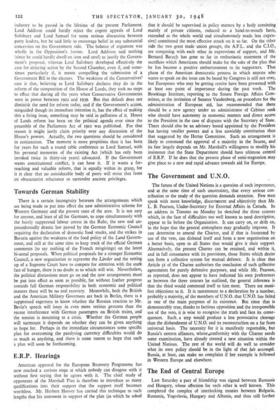E.R.P. Hearings
American approval for the European Recovery Programme has now reached a curious stage at which nobody can disagree with it without first saying that he agrees with it. The chief study of opponents of the Marshall Plan is therefore to introduce so many . qualifications into their support that the support itself becomes worthless. Mr. Herbert Hoover has carried this technique to such lengths that his statement in support of the plan (in which he asked that it should be supervised in policy matters by a body consisting mainly of private citizens, reduced to a hand-to-mouth basis, extended to the whole world and simultaneously made less expen- sive) constituted the most effective attack on it so far. On the other side the two great trade union groups, the A.F.L. and the C.I.O., are competing with. each other in expressions of support, and Mr. Bernard Baruch has gone so far in enthusiastic statement of the sacrifices which Americans should make for the sake of the plan that he has become a positive embarrassment to its supporters. That phase of the American democratic process in which anyone who wants to speak on the issue can be heard by Congress is still not over, but Europeans who may be getting restive have been presented with at least one point of importance during the past week. The Brookings Institute, reporting to the Senate Foreign Affairs Corn- mince, at the invitation of Senator Vandenberg, on procedure for the administration of European aid, has recommended that there should be a new agency under an administrator of Cabinet rank who should have autonomy in economic matters and direct access to the President in the case of disputes with the Secretary of State. There should also be an advisory board appointed by the President but having smaller powers and a less unwieldy constitution than that suggested by the Herter Committee. Such an arrangement is likely to command the approval of a majority in the Senate, and its fate largely depends on Mr. Marshall's willingness to modify his insistence that the State Department should have ultimate control of E.R.P. If he does that the present phase of semi-stagnation may give place to a new and rapid advance towards aid for Europe.


































 Previous page
Previous page